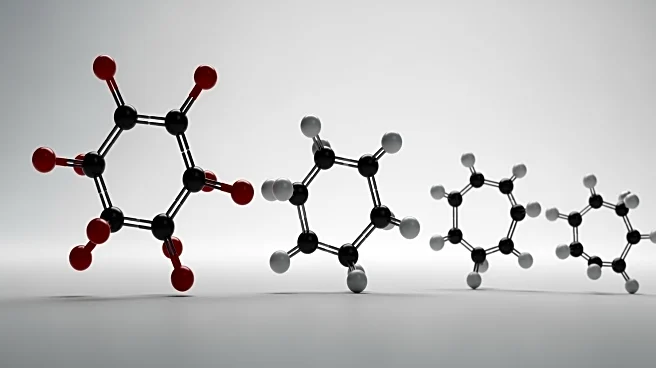What's Happening?
Researchers have developed a novel approach to designing structured peptides using a key-cutting machine algorithm. This method focuses on synthesizing peptides with low aggregation potential and high antimicrobial activity against clinically relevant
bacterial strains, including ESKAPEE pathogens. The study synthesized 12 peptide sequences, with nine demonstrating effective minimum inhibitory concentrations against at least one bacterial strain. The peptides were designed computationally, synthesized chemically, and tested for antimicrobial activity both in vitro and in vivo. The research aims to address the challenge of bacterial resistance by creating peptides that can effectively permeabilize bacterial membranes and depolarize cytoplasmic membranes, thereby inhibiting bacterial growth.
Why It's Important?
The development of tailored peptides is significant in the fight against antibiotic-resistant bacteria, which pose a major threat to public health. By creating peptides that can effectively target resistant strains, this research offers a potential solution to the growing problem of antibiotic resistance. The ability to design peptides with specific properties, such as solubility and reduced aggregation, enhances their effectiveness and safety for therapeutic use. This advancement could lead to new treatments for infections that are currently difficult to manage with existing antibiotics, potentially reducing healthcare costs and improving patient outcomes.
What's Next?
Future research will likely focus on optimizing the peptide design algorithm to enhance its efficiency and effectiveness. Researchers may explore the integration of machine learning-based predictors to further refine peptide properties. Additionally, clinical trials could be conducted to evaluate the safety and efficacy of these peptides in human patients. The continued development of this technology could lead to the creation of a new class of antimicrobial agents, providing a crucial tool in the ongoing battle against antibiotic-resistant bacteria.
Beyond the Headlines
The ethical implications of synthetic peptide design include considerations of safety and environmental impact. As synthetic biology advances, it is crucial to ensure that new technologies do not inadvertently harm ecosystems or human health. Regulatory frameworks may need to be updated to address the unique challenges posed by synthetic organisms and peptides. Furthermore, the cultural acceptance of synthetic biology innovations will play a role in their adoption and integration into healthcare practices.
















